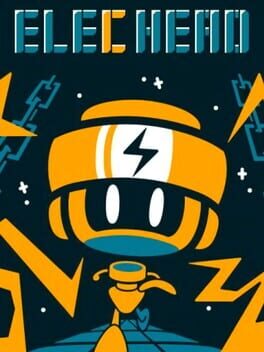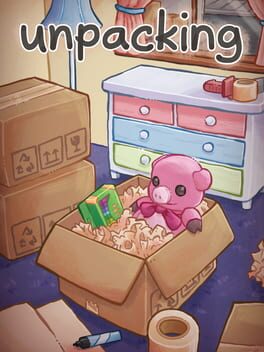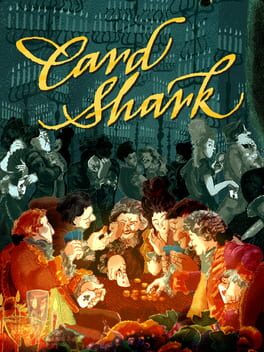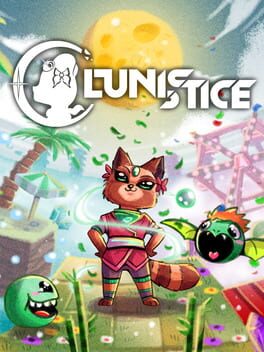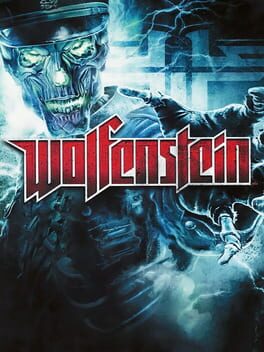Pyronoid
Bio
Nothing here!
Badges

Popular
Gained 15+ followers

2 Years of Service
Being part of the Backloggd community for 2 years

Liked
Gained 10+ total review likes

GOTY '22
Participated in the 2022 Game of the Year Event

Best Friends
Become mutual friends with at least 3 others

Noticed
Gained 3+ followers
022
Total Games Played
000
Played in 2024
003
Games Backloggd
Recently Played See More
Recently Reviewed See More
Card Shark has drawn many comparisons, at least as far as I've seen, to WarioWare, and I think it's a comparison with a lot of merit to it in some way: cheating at card games is done in a multitude of ways, and there are a lot of techniques you get taught throughout the course of the game, such as various ways of shuffling, dealing, how to mark a card for yourself, or how to signal valuable information to another player. One way of conceptualising these is as a set of independent mini-games, requiring specific inputs to succeed; you are taught a technique and given as long as you like to practice it, before stepping into 17th Century France to attempt to pull it off for real, with the additional pressure of real people and their scrutinous gaze. The difference here is that you will use one technique for one "level", repeating the technique the requisite three times in order to successfully strip your mark of as much gold (or, I suppose it would be livre?) as you possibly can while avoiding detection. It's tempting to suggest that there should have been a bit more variety in these techniques - really, each one you learn and catalog is a combination of smaller techniques, and I think there could be some room for expression and creative combination to make your own full techniques - but the method presented helps to keep you on your toes as you pivot from strategy to strategy while trying to generate funds.
I will readily admit that I found the intersection of narrative and gameplay absolutely gripping; to briefly get you up to speed on the narrative premise, you play a peasant boy from a small village who is swept up by the Comte de Saint-Germain into the French aristocracy, whereupon you and your new partner intend to lie, cheat and steal your way to both financial and political success. Along the way you meet various significant historical figures, and become enveloped in plots and intrigue. The story plays out in little snippets of dialogue in between rounds of the popular card game of the era, the specifics of which are completely abstracted away from you, the player, to much benefit. Playing Solitaire with Voltaire would be frightfully boring; taking all of his copper, on the other hand? Exhilarating.
Presentation is really the keyword for Card Shark, which feels very appropriate given that it's all about cheating at cards; it's all well and good knowing and understanding various forms of cheating cards, but you need to know how to do it discretely, use distraction, subterfuge, seize the smallest windows of opportunity to give yourself the upper hand and, if you're feeling especially confident, your opponent the lower hand. Something I really like about Card Shark is the double impact of both the lovely painterly aesthetic, evoking baroque paintings - of the very era in which we find our protagonist - and the visual presentation resembling a stage play with you in the audience for it all; often times a character will enter another room, which will then be transitioned as a parallel to the former, which looks superb and really evokes the idea of a stage play. It's even backed with a beautifully composed soundtrack; one highlight is the piece which plays when learning a new technique from your mentor, a suitably think-y tune that matches the atmosphere of preparing for a night of deception in high society.
It's a really nice combination of all the various aesthetic choices which combine with the gameplay to make a really compelling experience altogether; there's a moment early in the game where a fatal accident results in the Comte profiting financially, which is presented by the UI akin to as if you had just won at the card game you had been playing moments earlier; might have just been a convenient way of signifying you had earned money, but there's something I really liked about this way of presenting the information, like everything was nothing more than a game to Comte, and so you must too embrace that mindset. There's an even greater example of this sort of narrative design, that I really don't want to spoil, so I'll just tell you: Death is not the end.
I played Card Shark over the course of four nights, stopping for the night each time I reached the end of a chapter - it's funny to think of each break like an intermission - and was thoroughly engrossed the entire time. You won't learn much about French history, despite the presence of real historical figures, but you might learn a thing or two about cheating at cards, even if its just knowing you'd be terrible at it, like me.
I will readily admit that I found the intersection of narrative and gameplay absolutely gripping; to briefly get you up to speed on the narrative premise, you play a peasant boy from a small village who is swept up by the Comte de Saint-Germain into the French aristocracy, whereupon you and your new partner intend to lie, cheat and steal your way to both financial and political success. Along the way you meet various significant historical figures, and become enveloped in plots and intrigue. The story plays out in little snippets of dialogue in between rounds of the popular card game of the era, the specifics of which are completely abstracted away from you, the player, to much benefit. Playing Solitaire with Voltaire would be frightfully boring; taking all of his copper, on the other hand? Exhilarating.
Presentation is really the keyword for Card Shark, which feels very appropriate given that it's all about cheating at cards; it's all well and good knowing and understanding various forms of cheating cards, but you need to know how to do it discretely, use distraction, subterfuge, seize the smallest windows of opportunity to give yourself the upper hand and, if you're feeling especially confident, your opponent the lower hand. Something I really like about Card Shark is the double impact of both the lovely painterly aesthetic, evoking baroque paintings - of the very era in which we find our protagonist - and the visual presentation resembling a stage play with you in the audience for it all; often times a character will enter another room, which will then be transitioned as a parallel to the former, which looks superb and really evokes the idea of a stage play. It's even backed with a beautifully composed soundtrack; one highlight is the piece which plays when learning a new technique from your mentor, a suitably think-y tune that matches the atmosphere of preparing for a night of deception in high society.
It's a really nice combination of all the various aesthetic choices which combine with the gameplay to make a really compelling experience altogether; there's a moment early in the game where a fatal accident results in the Comte profiting financially, which is presented by the UI akin to as if you had just won at the card game you had been playing moments earlier; might have just been a convenient way of signifying you had earned money, but there's something I really liked about this way of presenting the information, like everything was nothing more than a game to Comte, and so you must too embrace that mindset. There's an even greater example of this sort of narrative design, that I really don't want to spoil, so I'll just tell you: Death is not the end.
I played Card Shark over the course of four nights, stopping for the night each time I reached the end of a chapter - it's funny to think of each break like an intermission - and was thoroughly engrossed the entire time. You won't learn much about French history, despite the presence of real historical figures, but you might learn a thing or two about cheating at cards, even if its just knowing you'd be terrible at it, like me.
Goodness, what an absolute treat this game is! Played through the entirety of just Hana's story, took about 4 hours, includiong all collectibles (but not all S ranks). Will definitely be going back to play as the other two characters in full to round off the game in the future.
It's rare to play a game that just feels so complete, so absolutely tight and focused, like a person wrote out their specification, picked up their tools and set to work, and not only crafted exactly what they had outlined, but that what they ended up with translated so unbelievably well from paper to product. There's not a foot out of step, every aspect of the game feeling so carefully considered and constructed, a really impressive passion project! The core of the experience truly has to be the incredibly tight control system, Hana feeling like an absolute dream to control from the moment you start playing, and only feeling better and better as you master the tiny intricacies of the system; I find myself not playing a lot of 3D platformers, and I've no idea why that is, but Lunistice instantly hooked me with its great movement and sensible controls (if putting Jump on one of your shoulder buttons becomes an industry norm, I will be immensely pleased).
Each world beyond the first one introduces some new mechanic which changes the way you interact with the levels, but crucially, your core set of skills remains the same throughout, which results in a really nice organic increase in challenge as you go through - a particular favourite of mine is the dessert-themed world which uses music and rhythm for environmental challenge - it might lack the sort of replayability that comes with taking new skills back to old stages like an ULTRAKILL or OlliOlli World but it makes for a compelling first-time run (and, additionally, there are other characters who bring that sort of challenge if you like, which I think is a nice way to diversify the game!) With each new world comes a new theme, both visual and musical, and I'd like to highlight the soundtrack in this regard; nicely crafted tunes for each world and, really, just a wonderful soundtrack all over! I love the different visual styles of all the worlds and, in general, the game, too - it's clearly meant to be played on a CRT, but there's a filter for that if you need it - an appropriately dream-like landscape with random elements jutting out of the clouds, it's really beautiful, and really capitalises on both the limitations of a small development team and captures the spirit of the era of games it tries to evoke.
There's a nice little bit of narrative going on, which is dished out to you as a reward for exploring the levels fully and finding all the collectibles; its a nice incentive to dig through the game proper if the intrinsic satisfaction of fully exploring the levels didn't work for you, and I have to say, there's some really interesting ludonarrative stuff going on that I don't want to spoil. I'd say run through without worrying about collectibles, then go back through and go for 100% for maximum satisfaction.
Honestly, this might be a boring review, I just can barely think of any criticisms of this game - Hana's footstep sounds get a bit annoying, there you go - it's just been an absolute delight to play through. This is a proper little bitesize treat of a game and I can't wait to see more from this developer.
It's rare to play a game that just feels so complete, so absolutely tight and focused, like a person wrote out their specification, picked up their tools and set to work, and not only crafted exactly what they had outlined, but that what they ended up with translated so unbelievably well from paper to product. There's not a foot out of step, every aspect of the game feeling so carefully considered and constructed, a really impressive passion project! The core of the experience truly has to be the incredibly tight control system, Hana feeling like an absolute dream to control from the moment you start playing, and only feeling better and better as you master the tiny intricacies of the system; I find myself not playing a lot of 3D platformers, and I've no idea why that is, but Lunistice instantly hooked me with its great movement and sensible controls (if putting Jump on one of your shoulder buttons becomes an industry norm, I will be immensely pleased).
Each world beyond the first one introduces some new mechanic which changes the way you interact with the levels, but crucially, your core set of skills remains the same throughout, which results in a really nice organic increase in challenge as you go through - a particular favourite of mine is the dessert-themed world which uses music and rhythm for environmental challenge - it might lack the sort of replayability that comes with taking new skills back to old stages like an ULTRAKILL or OlliOlli World but it makes for a compelling first-time run (and, additionally, there are other characters who bring that sort of challenge if you like, which I think is a nice way to diversify the game!) With each new world comes a new theme, both visual and musical, and I'd like to highlight the soundtrack in this regard; nicely crafted tunes for each world and, really, just a wonderful soundtrack all over! I love the different visual styles of all the worlds and, in general, the game, too - it's clearly meant to be played on a CRT, but there's a filter for that if you need it - an appropriately dream-like landscape with random elements jutting out of the clouds, it's really beautiful, and really capitalises on both the limitations of a small development team and captures the spirit of the era of games it tries to evoke.
There's a nice little bit of narrative going on, which is dished out to you as a reward for exploring the levels fully and finding all the collectibles; its a nice incentive to dig through the game proper if the intrinsic satisfaction of fully exploring the levels didn't work for you, and I have to say, there's some really interesting ludonarrative stuff going on that I don't want to spoil. I'd say run through without worrying about collectibles, then go back through and go for 100% for maximum satisfaction.
Honestly, this might be a boring review, I just can barely think of any criticisms of this game - Hana's footstep sounds get a bit annoying, there you go - it's just been an absolute delight to play through. This is a proper little bitesize treat of a game and I can't wait to see more from this developer.
I really, really hate to speculate on behind-the-scenes, production stuff when talking about a game - I am, at the end of the day, uneducated in game development & production, and besides, it always feels less interesting to talk about since its just pure random speculation anyway - but it's kinda hard to talk about Wolfenstein without thinking about the behind-the-scenes of it all, because it feels like so much about the game stems from, I guess, mis-direction during its creation.
See the thing about Wolfenstein is it really feels like it was made by two teams who never ever collaborated; there are individual elements that are interesting to talk about, pieces that could be built into something quite cohesive and well-constructed if put together with the right extra pieces or in the right way. But the final product feels like a handful of really disparate mechanics and designs just thrown together to meet a deadline, there's no other way to conceptualise it in my head. You have a hub level, from which you go to other places around Isenstadt to complete missions, so it's kind of structured like an open-world game where you might come and go as you please to do the sort of things BJ does best - kill Nazis - but everywhere that isnt the hub areas is essentially its own linear level which you have virtually no reason to return to afterwards, unless you want to hunt collectibles (which, like, you might, but honestly I never did and I never struggled either). Maybe I'm not explaining it in the best way, it just feels really jarring to have an "open-world" which is actually just a level selection with some Nazis in it.
There's a monetary system where money can be earned either by finding certain collectibles or by completing missions, and the money is spent upgrading weapons & amulet powers. The game makes a point to tell you that there's not quite enough money in the game to enable you to get all the weapon upgrades, which I must admit is quite clever - usually games of this ilk are all too happy to make sure you're as beefy as possible if you spend enough time grinding some sort of resource - and being forced to prioritise and carefully consider your choices as you go is rather engaging, as you've no idea how much more money there is or how much you personally will be able to find. The problem is that also you can use this money to buy ammunition for all of the weapons, some are which are extremely rare in the game itself; so you immediately have this situation where your fairly limited currency can kind of be wasted? It's a system that would probably work really well in something like, I don't know, maybe Far Cry? But it just feels a bit at odds with the kind of game Wolfenstein has historically been and, indeed, was only one game ago. Power weapons are cool and even moreso when you know you have enough opportunity to use them - one major improvement in Serious Sam 4 was an abundance of laser cannon ammo - but this implementation feels oddly restrictive.
There's a weird problem with the narrative and presentation too, which feels like it hints at mechanics and systems that probably just didn't make it into the finished product; Nazis bark about "the American spy!" whenever they encounter you, but if we're being honest, you don't really do any spying in this game, and what you do doesn't really feel like the sort of thing that would give you the reputation amongst Nazis as a spy. Blazko is made the literal moment he arrives in Isenstadt, and every time you are seen on the street you are instantly recognised, so it all feels like maybe some kind of espionage mechanic was planned and then just dropped at some point? The Saboteur released around the same time and, while I never played it, it seems to hint at the sort of thing that Wolfenstein might have been going for. As you progress through the game, you meet members of two resistances, but while the game makes scarce use of cutscenes except for particularly dramatic moments (and some level transitions), interacting with the games cast consists of them basically blurting out their entire backstory and current motivations the moment they see you. Maybe comparison to the MachineGames Wolfenstein reboot is unfair, a series which started 5 years later and has vastly better characterisation and narrative, but maybe not when this game came out five years after Half-Life 2. I was genuinely shocked to learn John Carmack had been nowhere near this game, considering its approach to story-telling has his "story in a game is like story in porn" ethos written all over it.
This probably isn't the most elegantly written review - a bullet-point list of things about the game that I didn't particularly like isn't really my preferred way to talk about a game - it's just utterly bizarre because there's glimmers of excellence here. I know Raven Software are good and that is on display in Wolfenstein; the moment-to-moment gameplay of the games combat is actually really good, having aged surprisingly well, with a range of weapons and the ability to pair them up with some really entertaining magic powers, a particular highlight being the Empower power-up, which makes it an absolute treat to just strut through the open emptying magically supercharged MP40 rounds into Nazis with. There's a mechanic to the magic powers where you can use magical beasts to your advantage in combat, but only a little bit, or they will turn on you instead, which is really engaging and clever! I wish someone had reconsidered the choice to make the screen black & white when you run out of magic powers, because it reads kinda weird in a game with The Dreaded Regenerating Health System and it ends up becoming really easy to get gunned down because you had way less health than you thought, but this is an issue which is small potatoes in the big picture.
There's probably two decent games in here and then they got put in the teleporter from The Fly and Wolfenstein came out the other end.
See the thing about Wolfenstein is it really feels like it was made by two teams who never ever collaborated; there are individual elements that are interesting to talk about, pieces that could be built into something quite cohesive and well-constructed if put together with the right extra pieces or in the right way. But the final product feels like a handful of really disparate mechanics and designs just thrown together to meet a deadline, there's no other way to conceptualise it in my head. You have a hub level, from which you go to other places around Isenstadt to complete missions, so it's kind of structured like an open-world game where you might come and go as you please to do the sort of things BJ does best - kill Nazis - but everywhere that isnt the hub areas is essentially its own linear level which you have virtually no reason to return to afterwards, unless you want to hunt collectibles (which, like, you might, but honestly I never did and I never struggled either). Maybe I'm not explaining it in the best way, it just feels really jarring to have an "open-world" which is actually just a level selection with some Nazis in it.
There's a monetary system where money can be earned either by finding certain collectibles or by completing missions, and the money is spent upgrading weapons & amulet powers. The game makes a point to tell you that there's not quite enough money in the game to enable you to get all the weapon upgrades, which I must admit is quite clever - usually games of this ilk are all too happy to make sure you're as beefy as possible if you spend enough time grinding some sort of resource - and being forced to prioritise and carefully consider your choices as you go is rather engaging, as you've no idea how much more money there is or how much you personally will be able to find. The problem is that also you can use this money to buy ammunition for all of the weapons, some are which are extremely rare in the game itself; so you immediately have this situation where your fairly limited currency can kind of be wasted? It's a system that would probably work really well in something like, I don't know, maybe Far Cry? But it just feels a bit at odds with the kind of game Wolfenstein has historically been and, indeed, was only one game ago. Power weapons are cool and even moreso when you know you have enough opportunity to use them - one major improvement in Serious Sam 4 was an abundance of laser cannon ammo - but this implementation feels oddly restrictive.
There's a weird problem with the narrative and presentation too, which feels like it hints at mechanics and systems that probably just didn't make it into the finished product; Nazis bark about "the American spy!" whenever they encounter you, but if we're being honest, you don't really do any spying in this game, and what you do doesn't really feel like the sort of thing that would give you the reputation amongst Nazis as a spy. Blazko is made the literal moment he arrives in Isenstadt, and every time you are seen on the street you are instantly recognised, so it all feels like maybe some kind of espionage mechanic was planned and then just dropped at some point? The Saboteur released around the same time and, while I never played it, it seems to hint at the sort of thing that Wolfenstein might have been going for. As you progress through the game, you meet members of two resistances, but while the game makes scarce use of cutscenes except for particularly dramatic moments (and some level transitions), interacting with the games cast consists of them basically blurting out their entire backstory and current motivations the moment they see you. Maybe comparison to the MachineGames Wolfenstein reboot is unfair, a series which started 5 years later and has vastly better characterisation and narrative, but maybe not when this game came out five years after Half-Life 2. I was genuinely shocked to learn John Carmack had been nowhere near this game, considering its approach to story-telling has his "story in a game is like story in porn" ethos written all over it.
This probably isn't the most elegantly written review - a bullet-point list of things about the game that I didn't particularly like isn't really my preferred way to talk about a game - it's just utterly bizarre because there's glimmers of excellence here. I know Raven Software are good and that is on display in Wolfenstein; the moment-to-moment gameplay of the games combat is actually really good, having aged surprisingly well, with a range of weapons and the ability to pair them up with some really entertaining magic powers, a particular highlight being the Empower power-up, which makes it an absolute treat to just strut through the open emptying magically supercharged MP40 rounds into Nazis with. There's a mechanic to the magic powers where you can use magical beasts to your advantage in combat, but only a little bit, or they will turn on you instead, which is really engaging and clever! I wish someone had reconsidered the choice to make the screen black & white when you run out of magic powers, because it reads kinda weird in a game with The Dreaded Regenerating Health System and it ends up becoming really easy to get gunned down because you had way less health than you thought, but this is an issue which is small potatoes in the big picture.
There's probably two decent games in here and then they got put in the teleporter from The Fly and Wolfenstein came out the other end.

